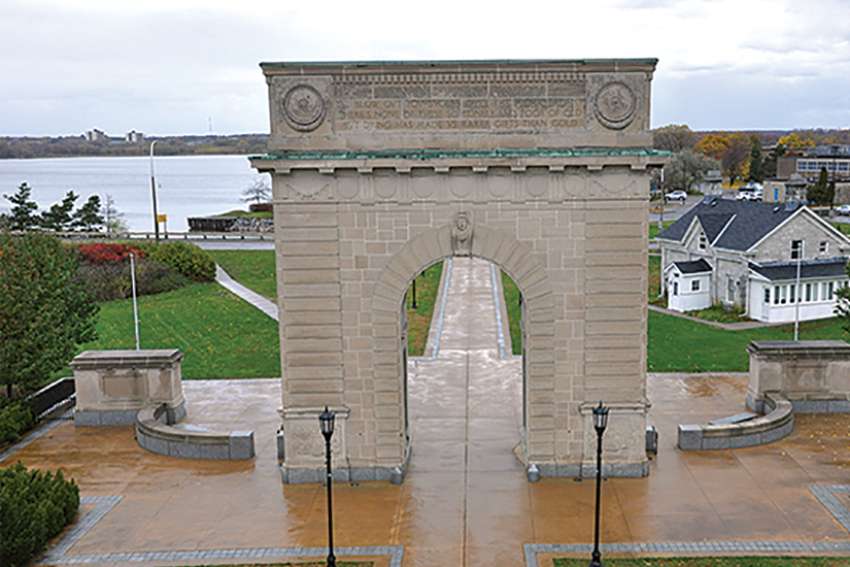Two marches: one to mark the beginning of a marriage and one to mark the beginning of a life in the military. Most of us understand the significance of a wedding march but less is known about the import of the march through the Memorial Arch for RMC graduates.
When they first arrived as new Officer Cadets, they marched “into” the college through the Arch. Several years later, having completed their studies, they pass through again, this time “out” into their life as commissioned officers. Apart from these two occasions, staff and students at the college walk around the Arch.
The Arch was built to commemorate graduates of the College who died in the First World War and previous conflicts. The cornerstone was laid on June 25, 1923, by the Governor-General of Canada, His Excellency Viscount Byng of Vimy, during that year’s graduation. It was unveiled a year later by Mrs. Joshua Wright, who lost two sons to the war. New granite pylons commemorate deaths of former cadets in wars and on peace-keeping missions.
Engraved atop the granite edifice is an excerpt from the poem, “The Dead” by Rupert Brooke:
Blow out you bugles over the rich Dead,
There’s none of these so lowly or poor of old,
But dying has made us rarer gifts than gold.
Both the wedding and the commissioning, predictably, fill my mother’s heart with joy and pride. That same mother’s heart grieves for the parents of Jack Hogarth, Andrei Honciu, Broden Murphy and Andrés Salek. The four young men were to pass under the Arch next week but died April 29 in a car accident on campus.
The shadow of death falls heavy on this year’s graduation ceremonies. The absence of the four will be noted by each graduate crossing the Convocation stage and receiving their commissions the following day. But in a sense that shadow is a constant presence for students and graduates of the RMC. The Memorial Arch does not reappear on campus like a mystical sword but is solid and imposing: a constant reminder of sacrifices made.
The report of the Minister of National Defence Advisory Panel, tasked with instructing the CAF on combating Systemic Racism and Discrimination, has been covered by The Register, the National Post, the Western Standard and others. Its recommendation in “Re-Defining Chaplaincy” that the military chaplaincy should exclude adherents of the three Abrahamic religions has been rightly criticized. Overlooked is its equally egregious suggestion that ethical and spiritual needs of CAF personnel can be met by chaplains guiding their charges through a new Total Health and Wellness Strategic Framework. Military chaplains are not social workers. Social workers cannot do the job of military chaplains.
I don’t know how conscious the Panel members are of their own mortality, or how well they recall facing the threats confronting active duty members, to say nothing of tragedies like the deaths of the cadets who died April 29. But do they really think human needs for guidance and succour can be sufficiently met by aridly bureaucratic Action Plans, or by the woke fantasies they have seen fit to rely on?
On the day of the unveiling of the Memorial Arch in 1924, the Rev. J. S. LaFlair delivered the closing prayer. He prayed for both the living and the dead and ended his prayer with the refrain of Rudyard Kipling’s 1874 poem, “Recessional:”
Lord God of Hosts, be with us yet,
Lest we forget — lest we forget!
We assume we are being encouraged to remember the ultimate sacrifice of the men and women of the military. But Kipling’s exhortation derives from Deuteronomy 6, “take heed lest you forget the Lord, who brought you out of the land of Egypt.” The march through the Memorial Arch is a recessional of sorts, an ambulatory hymn. As they pass, Kipling invites us to pray:
The tumult and the shouting dies;
The Captains and the Kings depart:
Still stands Thine ancient sacrifice,An humble and a contrite heart.
Lord God of Hosts, be with us yet,
Lest we forget — lest we forget!
(Farrow is a writer in Montreal.)


